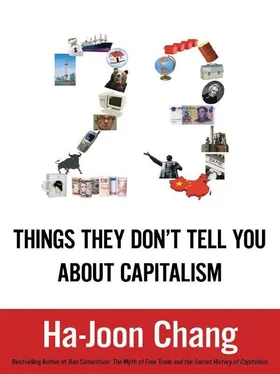Running companies in the interests of floating shareholders is not only inequitable but also inefficient, not just for the national economy but also for the company itself. As Jack Welch recently confessed, shareholder value is probably the ‘dumbest idea in the world’.
Thing 3: Most people in rich countries are paid more than they should be
In a market economy, people are rewarded according to their productivity. Bleeding-heart liberals may find it difficult to accept that a Swede gets paid fifty times what an Indian gets paid for the same job, but that is a reflection of their relative productivities. Attempts to reduce these differences artificially – for example, by introducing minimum wage legislation in India – lead only to unjust and inefficient rewarding of individual talents and efforts. Only a free labour market can reward people efficiently and justly.
The wage gaps between rich and poor countries exist not mainly because of differences in individual productivity but mainly because of immigration control. If there were free migration, most workers in rich countries could be, and would be, replaced by workers from poor countries. In other words, wages are largely politically determined. The other side of the coin is that poor countries are poor not because of their poor people, many of whom can out-compete their counterparts in rich countries, but because of their rich people, most of whom cannot do the same. This does not, however, mean that the rich in the rich countries can pat their own backs for their individual brilliance. Their high productivities are possible only because of the historically inherited collective institutions on which they stand. We should reject the myth that we all get paid according to our individual worth, if we are to build a truly just society.
Drive straight on . . . or dodge the cow (and the rickshaw as well)
A bus driver in New Delhi gets paid around 18 rupees an hour. His equivalent in Stockholm gets paid around 130 kronas, which was, as of summer 2009, around 870 rupees. In other words, the Swedish driver gets paid nearly fifty times that of his Indian equivalent.
Free-market economics tells us that, if something is more expensive than another comparable product, it must be because it is better. In other words, in free markets, products (including labour services) get paid what they deserve. So, if a Swedish driver – let’s call him Sven – is paid fifty times more than an Indian driver – let’s call him Ram – it must be because Sven is fifty times more productive as a bus driver than Ram is.
In the short run, some (although not all) free-market economists may admit, people may pay an excessively high price for a product because of a fad or a craze. For example, people paid ludicrous prices for those ‘toxic assets’ in the recent financial boom (that has turned into the biggest recession since the Great Depression) because they were caught in a speculative frenzy. However, they would argue, this kind of thing cannot last for long, as people figure out the true value of things sooner or later ( see Thing 16 ). Likewise, even if an underqualified worker somehow manages to get a well-paid job through deceit (e.g., fabricating a certificate) or bluffing in an interview, he will soon be fired and replaced, because it will quickly become apparent that he does not have the productivity to justify his wage. So, the reasoning goes, if Sven is getting paid fifty times what Ram is paid, he must be producing fifty times more output than Ram.
But is this what is really going on? To begin with, is it possible that someone drives fifty times better than another? Even if we somehow manage to find a way to measure quantitatively the quality of driving, is this kind of productivity gap in driving possible? Perhaps it is, if we compare professional racing drivers like Michael Schumacher or Lewis Hamilton with some particularly uncoordinated eighteen-year-old who has just passed his driving test. However, I simply cannot envisage how a regular bus driver can drive fifty times better than another.
Moreover, if anything, Ram would likely be a much more skilled driver than Sven. Sven may of course be a good driver by Swedish standards, but has he ever had to dodge a cow in his life, which Ram has to do regularly? Most of the time, what is required of Sven is the ability to drive straight (OK, give or take a few evasive manoeuvres to deal with drunken drivers on Saturday nights), while Ram has to negotiate his way almost every minute of his driving through bullock carts, rickshaws and bicycles stacked three metres high with crates. So, according to free-market logic, Ram should be paid more than Sven, not the other way round.
In response, a free-market economist might argue that Sven gets paid more because he has more ‘human capital’, that is, skills and knowledge accumulated through education and training. Indeed, it is almost certain that Sven has graduated from high school, with twelve years of schooling under his belt, whereas Ram probably can barely read and write, having completed only five years of education back in his village in Rajahstan.
However, little of Sven’s additional human capital acquired in his extra seven years of schooling would be relevant for bus driving ( see Thing 17 ). He does not need any knowledge of human chromosomes or Sweden’s 1809 war with Russia in order to drive his bus well. So Sven’s extra human capital cannot explain why he is paid fifty times more than Ram is.
The main reason that Sven is paid fifty times more than Ram is, to put it bluntly, protectionism – Swedish workers are protected from competition from the workers of India and other poor countries through immigration control. When you think about it, there is no reason why all Swedish bus drivers, or for that matter the bulk of the workforce in Sweden (and that of any other rich country), could not be replaced by some Indians, Chinese or Ghanaians. Most of these foreigners would be happy with a fraction of the wage rates that Swedish workers get paid, while all of them would be able to perform the job at least equally well, or even better. And we are not simply talking about low-skill workers such as cleaners or street-sweepers. There are huge numbers of engineers, bankers and computer programmers waiting out there in Shanghai, Nairobi or Quito, who can easily replace their counterparts in Stockholm, Linköping and Malmö. However, these workers cannot enter the Swedish labour market because they cannot freely migrate to Sweden due to immigration control. As a result, Swedish workers can command fifty times the wages of Indian workers, despite the fact that many of them do not have productivity rates that are higher than those of Indian workers.
Our story of bus drivers reveals the existence of the proverbial elephant in the room. It shows that the living standards of the huge majority of people in rich countries critically depend on the existence of the most draconian control over their labour markets – immigration control. Despite this, immigration control is invisible to many and deliberately ignored by others, when they talk about the virtues of the free market.
I have already argued ( see Thing 1 ) that there really is no such thing as a free market, but the example of immigration control reveals the sheer extent of market regulation that we have in supposedly free-market economies but fail to see.
While they complain about minimum wage legislation, regulations on working hours, and various ‘artificial’ entry barriers into the labour market imposed by trade unions, few economists even mention immigration control as one of those nasty regulations hampering the workings of the free labour market. Hardly any of them advocates the abolition of immigration control. But, if they are to be consistent, they should also advocate free immigration. The fact that few of them do once again proves my point in Thing 1 that the boundary of the market is politically determined and that free-market economists are as ‘political’ as those who want to regulate markets.
Читать дальше






![Ally Carter - [Gallagher Girls 01] I'd Tell You I Love You But Then I'd Have to Kill You](/books/262179/ally-carter-gallagher-girls-01-i-d-tell-you-i-lo-thumb.webp)





